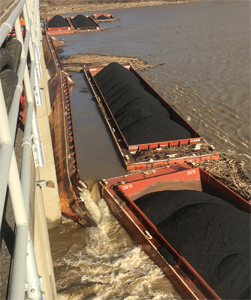Fifteen barges broke away after a bridge allision in downtown Louisville, Ky., on Christmas Day, and seven later sank against a dam located just downriver.
The 4,000-hp towboat Debbie Graham was upbound on the Ohio River with 15 loaded coal barges when the tow hit the upriver side of the Clark Memorial Bridge broadside to the current. The incident occurred at about 2010 at mile marker 603.5.
Authorities recovered six barges, but nine others became pinned against the McAlpine Dam. The dam spans the Falls of the Ohio about a mile downriver from the bridge.
U.S. Coast Guard Lt. Cmdr. Michael Metz declined to comment on a possible cause, citing the ongoing investigation. He also could not confirm which barge hit the bridge support pier, which was not damaged.
James Marine subsidiary Tennessee Valley Towing operates the 128-foot Debbie Graham. Company executives did not return email messages requesting comment on the incident. In a prepared statement, the company said it was cooperating with authorities.
Accident details are scarce, but video cameras pointed toward the bridge captured the vessel as it chugged upriver with its tow. Footage shows the head of the tow moving abruptly to port in the current as the barges passed under the span.
Debbie Graham’s stern barely cleared a bridge support as the current pushed the towboat and barges toward the Indiana side of the river, ultimately spinning the tow nearly 90 degrees. The port side of a forward barge struck a bridge support, causing all 15 barges to break free.
A river gauge located just downriver from the bridge registered 19 feet on the night of the incident, which is considered high but not yet at action or flood stage.
“There was a slug of water that came through, and it did raise the river a little bit,” Metz said in a phone interview. “It wasn’t a rapid rise, but any rise in the river is something that needs to be managed properly and operators need to take proper precautions.”
The Coast Guard did not say how the six barges were recovered. Two barges initially capsized against the McAlpine Dam, and over the next eight days five more barges sank as river levels rose and fell. Two other barges remained afloat against the dam throughout the response.
Katie Newton, a spokeswoman for the U.S. Army Corps of Engineers, which operates the dam, confirmed that one barge obstructed a tainter gate used to control water flow. She said there was no indication that the dam or its gates sustained any damage.
“We do not need to close that gate right now due to high river levels, so there is currently no impact to dam operations and we expect no long-term effects,” she said on Jan. 4. “An assessment will be conducted again once the barges are safely removed.”
Big River Salvage and McKinney Salvage began barge recovery and salvage operations on Jan. 9. One week later, three barges had been removed from the fixed weir portion of the dam, Newton said.
Each barge carried between 1,500 and 1,800 tons of coal. Authorities were not sure how much spilled into the waterway, but Kentucky officials do not expect any impact on aquatic wildlife or drinking water.
The Christmas bridge strike followed another incident involving Debbie Graham near Louisville last year. Coast Guard records indicate the vessel lost maneuverability with 12 barges in tow on April 9, 2018, while underway roughly 10 miles upriver from the McAlpine Dam. Authorities determined a jockey bar broke, forcing the rudder hard to starboard. Repairs cost about $10,000.

